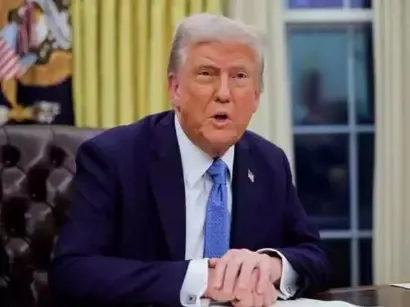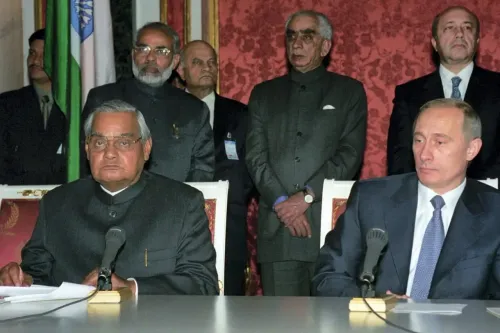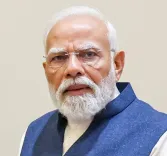Trump Holds Steady on 'Reciprocal Tariffs' Amid Market Decline

Synopsis
Key Takeaways
- Trump insists on the necessity of tariffs to correct trade deficits.
- World leaders are reportedly eager to negotiate deals.
- Market volatility is described by Trump as a necessary “medicine”.
- China has retaliated with countermeasures to US tariffs.
- Economists warn of a potential recession due to ongoing policies.
Washington, April 7 (NationPress) As global stock markets experienced a significant downturn on Monday, US President Donald Trump stood by his controversial tariff strategies, brushing aside worries about the economic repercussions. He asserted that world leaders are “dying to make a deal” to discuss the reciprocal tariffs.
With Asian markets opening to substantial losses and US futures indicating further drops, Trump attempted to alleviate concerns, suggesting that the market distress resulted from his tariffs was a necessary “medicine” to address persistent trade imbalances.
On Sunday, Trump refuted any claims of intentionally causing a market decline, stating that he could not foresee market responses. He reiterated that he would not engage in trade agreements with other nations unless they tackled the trade deficits.
“Sometimes you have to take medicine to fix something,” Trump remarked, alluding to the market fluctuations.
Since the initiation of his tariff measures, US companies have lost trillions in market value, with investors preparing for further repercussions.
Trump stated that any market adjustment would be “temporary,” downplaying the seriousness of the situation.
Speaking to media representatives aboard Air Force One, the US President noted that he had been in discussions with global leaders over the weekend and claimed that numerous countries were keen to negotiate a deal.
“They’re dying to make a deal,” he reiterated, emphasizing that tariffs were a crucial tool to balance the global market.
Despite the dramatic losses in international markets, which many feared could lead to a full-scale economic crisis, the Trump administration showed no inclination to relent from its assertive tariff approach.
China, notably, announced countermeasures, escalating concerns regarding an intensifying trade war.
Economists have cautioned that if the US persists on its current trajectory, the global economy could face a significant downturn.
Bruce Kasman, Chief Economist at JPMorgan, estimated the risk of a recession at 60 percent, indicating that Trump’s trade strategies might push a stable global expansion into turmoil.
The market unrest has drawn parallels to the 1987 “Black Monday” crash, where global markets lost $1.71 trillion in just one day.
CNBC's Jim Cramer warned that if Trump's trade policies persist, markets could encounter a similarly disastrous event. As the markets prepare for another tumultuous week, all attention remains on the White House and the forthcoming actions in the ongoing trade dispute.










